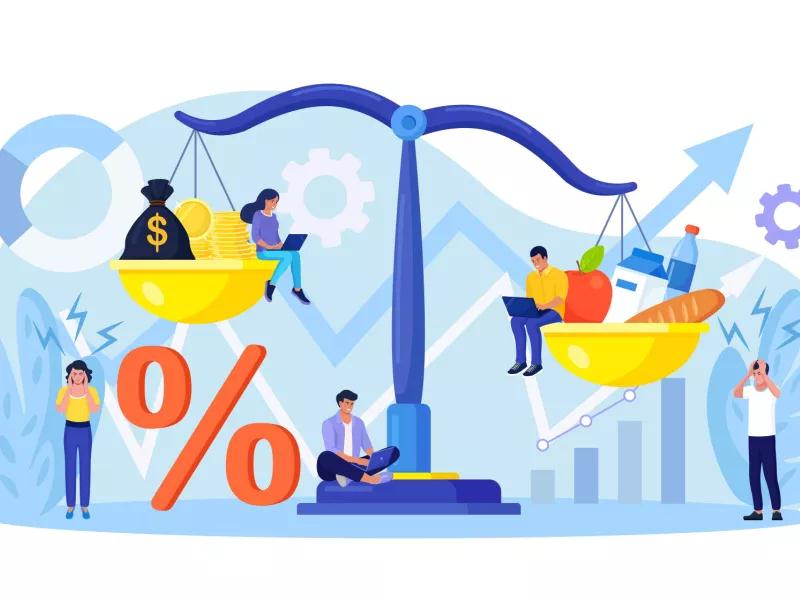State capitalism is an economic system in which the state carries out commercial (i.e. for-profit) economic activity and where the means of production are organized and managed as state commercial enterprises (including processes of capital accumulation, wage labor and centralized management), or in the case where there is a dominance of corporate government agencies (agencies organized according to business management practices) or of joint stock companies in which the state has control actions.
Marxist literature defines state capitalism as a social system that combines capitalism with ownership or control of a state . By this definition, a state capitalist country is one in which the government controls the economy and essentially acts as a large corporation, extracting surplus value from labor to invest in greater production.
This designation applies regardless of the state’s political objectives (even if the state is nominally socialist). Many scholars maintain that the Soviet Union and the countries that were inspired by it, including Maoist China, were state capitalist systems. Many scholars also argue that the current People’s Republic of China constitutes a form of state capitalism.
As a term, state capitalism is also used by some in reference to a private capitalist economy controlled by a state , that is, a private economy that is subject to state economic planning.
This term has been used to describe the controlled economies of the Great Powers in World War I. Alternatively, state capitalism may refer to an economic system where the means of production are privately owned, but the state has considerable control over the allocation of credit and investment, as in the case of France during the period of dirigisme after the Second World War.
Other examples of state capitalism include the economies of Denmark, Norway and Sweden, which have almost equal mixes of private and state ownership. These countries have enough state ownership and regulation to be legitimately labeled as forms of democratic state capitalism, they are also referred to as ” mixed economies. ” Theoretically, a system that has complete state ownership of the economy but is democratic would be called democratic state capitalism . Systems in which an authoritarian state has complete control of the economy are called authoritarian state capitalist systems. An existing example of this type of system would be North Korea.
State capitalism has also sometimes been used interchangeably with state monopoly capitalism to describe a system in which the state intervenes in the economy to protect and promote the interests of large-scale businesses.
Noam Chomsky, a libertarian socialist, applies the term ‘state capitalism’ to economies such as the United States, where large companies deemed “too big to fail” receive publicly funded government bailouts that mitigate risk-taking. of companies and undermine market laws , and where private production is largely financed by the state at public expense, but private owners reap the profits. This practice contrasts with the ideals of both socialism and laissez-faire capitalism .
There are several theories and criticisms of state capitalism, some of which existed before the October Revolution of 1917. Common themes among them identify that workers do not significantly control the means of production and that capitalist social relations and production with Profit pursuits still occur within state capitalism.
In Socialism: Utopian and Scientific (1880), Friedrich Engels argued that state ownership does not eliminate capitalism by itself, but rather that this would be the final stage of capitalism, consisting of the ownership and management of large-scale production and communication. by the bourgeoisie. state. Engels argued that the tools to end capitalism are found in state capitalism.
Origins of the term
The term State Capitalism was first used by Wilhelm Liebknecht in 1896, who said: «No one has fought state socialism more than we German socialists; “No one has demonstrated more distinctively than I that state socialism is really state capitalism.”
It has been suggested that the concept of state capitalism dates back to Mikhail Bakunin ‘s critique during the First International of the potential for state exploitation under Marxist-inspired socialism, or to Jan Waclav Machajski’s argument in The Intellectual Worker (1905 ) that socialism was a movement of the intelligentsia as a class, which resulted in a new type of society that was called state capitalism. For anarchists, state socialism is equivalent to state capitalism , therefore oppressive and merely a shift from private capitalists to the state being the sole employer and capitalist.
During the First World War, using Vladimir Lenin’s idea that tsarism was taking a Prussian path to capitalism, the Bolshevik Nikolai Bukharin identified a new stage in the development of capitalism in which all sectors of national production and all important social institutions had been managed by the state—This new stage called state capitalism.
After the October Revolution, Lenin used the term positively. In the spring of 1918, during a brief period of economic liberalism prior to the introduction of war communism and again during the New Economic Policy (NEP) of 1921, Lenin justified the introduction of state capitalism politically controlled by the dictatorship of the proletariat to greater central control. and develop productive forces:
« Reality tells us that state capitalism would be a step forward. If in a small space of time we could achieve state capitalism, that would be a victory.
Lenin argued that the state should temporarily manage the economy, which would eventually be taken over by the workers. For Lenin, “state capitalism” did not mean that the state would run most of the economy, but rather that “state capitalism” would be one of the five elements of the economy:
« State capitalism would be a step forward compared to the current state of things in our Soviet Republic. If in about six months state capitalism were established in our Republic, this would be a great success and a sure guarantee that within a year socialism will have gained firm and permanent control. «
Approaches from liberalism to state capitalism
Murray Rothbard, an anarcho-capitalist philosopher, uses the term interchangeably with the term state monopoly capitalism and uses it to describe a partnership of government and big business in which the state intervenes on behalf of big capitalists against the interests of consumers.
Distinguish this from laissez-faire capitalism , where large companies are not protected from market forces. This usage dates back to the 1960s, when Harry Elmer Barnes described the post-New Deal economy of the United States as “state capitalism.” More recently, Andrei Illarionov, former economic adviser to Russian President Vladimir Putin, resigned in December 2005, protesting Russia’s “embrace of state capitalism.”
However, the term is not used by classical liberals to describe public ownership of the means of production. The explanation of why this is so is given by the Austrian school economist Ludwig von Mises, who states:
« The socialist movement goes to great lengths to frequently circulate new labels for its ideally constructed state. Each worn-out label is replaced by another that raises hopes for a definitive solution to the basic insoluble problem of socialism, until it becomes clear that nothing but the name has been changed. The most recent slogan is “State Capitalism.” It is not commonly understood that this covers nothing more than what used to be called planned economy and state socialism, and that state capitalism, planned economy and state socialism only diverge in non-essential aspects of the “classical” ideal of socialism. egalitarian. «
State capitalism seen by the West
An alternative definition is that state capitalism is a close relationship between government and private capitalism, such as one in which private capitalists produce for a guaranteed market. An example of this would be the military-industrial complex in which autonomous entrepreneurial companies produce for lucrative government contracts and are not subject to the discipline of competitive markets.
Both the Trotskyist definition and this one derive from discussion among Marxists in the early 20th century, especially Nikolai Bukharin, who in his book Imperialism and World Economy thought that advanced imperialist countries exhibited the latter definition and considered (and rejected) the possibility of that they can get there first.
State capitalism is practiced by a variety of Western countries with respect to certain strategic resources important to national security. These may also involve private investment. For example, a government may own or even monopolize oil production or transportation infrastructure to ensure availability in the event of war.
There are limits, the arguments go, to which state capitalism exists to ensure that wealth creation does not threaten the political power of the ruling elite, which is not threatened by close connections between government and industries, while State capitalists fear the creative destruction of capitalism, the threat of revolution and any significant change to the system results in the persistence of industries that have outlived their economic usefulness and an inefficient economic environment that is ill-equipped to inspire innovation.
Perspectives from European studies on the concept
Several European scholars and political economists have used the term to describe one of the three main varieties of capitalism that prevail in the modern context of the European Union. This approach is mainly influenced by Schmidt’s (2002) article on The Futures of European Capitalism, in which he divides modern European capitalism into three groups, namely market, managed and state. Here, state capitalism refers to a system where high coordination between the state, large companies and unions guarantees economic growth and development in a quasi-corporate model.
The author cites France and, to a lesser extent, Italy as the main examples of modern European state capitalism. A general theory of capitalist forms, according to which state capitalism is a particular case, was developed by Ernesto Screpanti , who argued that Soviet-type economies of the 20th century used state capitalism to sustain processes of primitive accumulation. In their historical analysis of the Soviet Union, Marxist economists Richard D. Wolff and Stephen Resnick identify state capitalism as the dominant class system throughout the history of the Soviet Union.
State monopoly capitalism
The theory of state monopoly capitalism was initially a neo-Stalinist doctrine popularized after World War II. Lenin had claimed in 1916 that the First World War had transformed laissez-faire capitalism into monopoly capitalism, but he did not publish any extensive theory on the subject. The term refers to an environment in which the state intervenes in the economy to protect large monopolistic or oligopolistic companies from competition from smaller companies.
The main principle of the ideology is that large companies, having achieved a monopoly or cartel position in most major markets, merge with the government apparatus. Thus, a type of financial oligarchy or conglomerate occurs, whereby government officials aim to provide the social and legal framework within which giant corporations can operate most effectively. This is a close partnership between big business and government and it is argued that the aim is to fully integrate unions into that partnership.
The theory of state monopoly capitalism aims to define the final historical stage of capitalism after monopoly capitalism, in accordance with Lenin’s definition of the characteristics of imperialism in his short pamphlet of the same name.
Occasionally, the concept of state capitalism also appears in neo-Trotskyist theories of state capitalism, as well as in libertarian anti-state theories. The analysis carried out is usually identical in its main characteristics, but very different political conclusions are drawn from it.
Political implications
Since monopoly capital took over the world, it has kept most of humanity in poverty, dividing all profits among the most powerful group of countries. The standard of living in those countries is based on the extreme poverty of our countries. Ernesto Che Guevara, 1965
The strategic political implication of the theory of state capitalism towards the end of the Joseph Stalin era and after was that the labor movement should form a popular democratic alliance under the leadership of the communist party with the progressive middle classes and small businesses against the state and big business (called monopoly for short). Sometimes this alliance was also called the antitrust alliance.
Neo-Trotskyist theory
In neo-Trotskyist theory, such an alliance (anti-monopoly alliance between workers and small businesses) was rejected as being based on a false popular front strategy or political opportunism, which is said to be incompatible with a permanent revolution or with the principle of independent political action of the working class.
The state in Soviet-type societies was redefined by neo-Trotskyists as also state monopoly capitalist. There was no difference between the West and the East in this regard. Consequently, some kind of anti-bureaucratic revolution was said to be required, but different Trotskyist groups quarreled over what form such a revolution would need or could take.
Some Trotskyists believed that the anti-bureaucratic revolution would occur spontaneously, inevitably and naturally, others believed that it was necessary to organize it, with the goal of establishing a society owned and operated by the working class. According to the neo-Trotskyists, the communist party could not play its leading role because it did not represent the interests of the working class.
Reviews
When economist Eugen Varga introduced the theory of state capitalism, orthodox Stalinist economists considered it incompatible with the doctrine that state planning was an exclusive feature of socialism and that “anarchy of production reigns under capitalism. “
Critics of the theory of state capitalism (e.g. Ernest Mandel and Leo Kofler) stated the following:
The theory of state capitalism wrongly implied that the state could somehow override intercapitalist competition, capitalism’s laws of motion, and market forces in general, supposedly canceling the operation of the law of value.
Capitalist state theory lacked a sophisticated explanation of the class basis of the state and the actual links between governments and elites. He posited a monolithic structure of domination that did not actually exist that way.
The theory could not explain the emergence of neoliberal ideology in the business class, which states precisely that an important social goal should be a reduction in the influence of the state on the economy.
This theory also could not clearly show what the difference was between a socialist state and a bourgeois state, except that in a socialist state the communist party, or rather its central committee, played the main political role. In that case, the class content of the state itself was defined purely in terms of the policies of the ruling political party or its central committee.
In popular culture
WALL-E, the animated film, has the “Buy n’ Large” corporation acting as the de facto and possibly de jure government in the decades before and after Earth’s evacuation.
The Druuge , an alien race in Star Control , a science fiction video game, are ruled by the Crimson Corporation which owns the planet Druuge and everything on it. All Druuge are employees and/or shareholders of this corporation and Druuge who lose their jobs are immediately executed for stealing the planet’s air, owned by the company, by breathing it.
Examples of state capitalism in the 21st century
State capitalism is distinguished from mixed capitalist economies where the state intervenes in markets to correct market failures or to establish provisions for social regulation or social welfare as follows: the state operates businesses for the purpose of accumulating capital and direct investment within the framework of a free market or a mixed market economy. In such a system, government functions and public services are often organized as corporations, companies, or business enterprises.
China continental
Many analysts claim that China is one of the leading examples of state capitalism in the 21st century. In his book The End of the Free Market: Who Wins the War Between States and Corporations, political scientist Ian Bremmer describes China as the main driver of the rise of state capitalism as a challenge to the free market economies of the developed world, particularly after of the financial crisis of 2007-2008. Bremmer draws a broad definition of state capitalism as such:
In this system, governments use various types of state-owned enterprises to manage the exploitation of the resources they consider the crown jewels of the state and to create and maintain large numbers of jobs. They use select private companies to dominate certain economic sectors. They use so-called sovereign wealth funds to invest their extra cash in ways that maximize state profits. In all three cases, the state is using markets to create wealth that can be directed as political officials see fit. And in all three cases, the final motive is not economic (maximizing growth) but political (maximizing the power of the state and the leadership’s chances of survival). This is a form of capitalism, but one in which the state acts as the dominant economic actor and uses markets primarily for political gain.
Following Bremmer, Aligica and Tarko, they further develop the theory that state capitalism in countries such as modern China and Russia is an example of a rent-seeking society. They argue that after realizing that centrally planned socialist systems could not effectively compete with capitalist economies, the political elites of the Communist Party attempt to design a limited form of economic liberalization that would increase efficiency and allow them to maintain political control and control. can.
In his article “We’re All State Capitalists Now,” British historian and Laurence A. Tisch Professor of History at Harvard University, Niall Ferguson, warns against “a pointless oversimplification to divide the world into ‘market capitalist’ camps.” and ‘state capitalists’. The reality is that most countries are organized along a spectrum where both the intent and extent of state intervention in the economy vary . He then observes:
The real competition of our time is not between a state capitalist China and a market capitalist America, with Europe somewhere in between. It is a competition that takes place within the three regions as we all struggle to strike the right balance between the economic institutions that generate wealth and the political institutions that regulate and redistribute it.
In the common program established by the Chinese People’s Political Consultative Conference in 1949, effectively the country’s interim constitution, state capitalism meant an economic system of corporatism. The conference stated the following:
Wherever necessary and possible, private capital will be encouraged to develop in the direction of state capitalism.
Analysis of the Chinese model by economists Julan Du and Chenggang Xu finds that the contemporary economic system of the People’s Republic of China represents a state capitalist system rather than a market socialist system. The reason for this categorization is the existence of financial markets in the Chinese economic system, which are absent in market socialist literature and classical models of market socialism; and that state profits are retained by companies rather than being distributed equally among the population in a basic income/social dividend or similar scheme, which are main features in market socialist literature. They conclude that China is neither a form of market socialism nor a stable form of capitalism.
Taiwan
Taiwan’s economy has been classified as a state capitalist system influenced by its Leninist model of political control, a legacy that still lingers in the decision-making process. Taiwan’s economy includes a number of state-owned enterprises, but the Taiwanese state’s role in the economy shifted from that of an entrepreneur to a minority investor in companies along with the democratization agenda of the late 1980s.
Some Taiwanese economists refer to Taiwan’s model of economy as party-state capitalism.
Norway
Norway’s government has ownership stakes in many of the country’s largest listed companies, owns 37% of the Oslo stock market, and operates the country’s largest unlisted companies, including Statoil and Statkraft. The government also operates a sovereign wealth fund, the Norwegian Government Pension Fund , whose partial goal is to prepare Norway for a post-oil future.
Modern Norwegian state capitalism has its origins in public ownership of the country’s oil reserves and the country’s post-World War II social democratic reforms.
Singapore
Singapore’s government owns controlling shares in many government-linked companies and directs investment through sovereign wealth funds, an arrangement commonly cited as state capitalism.
Singapore has attracted some of the world’s most powerful corporations through business-friendly legislation and by encouraging Western-style corporatism, with close cooperation between the state and corporations.
Large holdings of companies linked to the Singapore government and the state’s close cooperation with companies are defining aspects of Singapore’s economic model.











